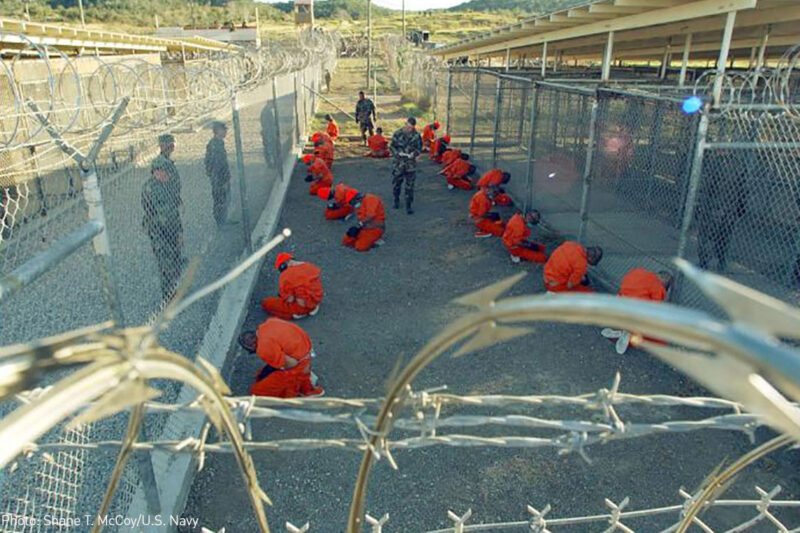
I spent last week in Guantánamo Bay, where I was supposed to be observing four days of pre-trial hearings in the military commission prosecution of the 9/11 defendants. But as is so often the case, on three of those days, the hearings were closed. On the single day of open hearings, the proceeding focused on the government’s destruction of key evidence in the case. This past weekend, defense lawyers confirmed that the evidence concerns a secret CIA black site abroad where the defendants and others were severely tortured.
Almost 15 years have passed since the attacks of 9/11, and yet the Guantánamo military commissions are still muddling through pre-trial motions, with virtually the same confusion and lack of transparency that has characterized these proceedings for years. The dichotomy between the importance of the proceedings and their virtual absence from public discourse is astonishing.
The proceedings that did take place last week focused on the government’s destruction of evidence, which may have been irreplaceable for the defense, and over which the judge had issued a protective order. Defense attorney David Nevin, who represents Khalid Sheikh Mohammad, referred to this evidence as “among the most important evidence of the case.” As Nevin argued, the government’s torture and mistreatment of the defendants is central to the question of whether they can lawfully be subject to the death penalty.
This key issue has been percolating for some time.
More than two years ago, the judge presiding over the trial, Army Col. James L. Pohl, issued a protective order to preserve what’s now confirmed as CIA black site evidence. At some point after that, the prosecution had a closed-door hearing with Judge Pohl. Without defense counsel’s participation or even knowledge, the prosecution convinced the judge to lift the protective order, and the government then destroyed the evidence. The defense lawyers said they didn’t know that the protective order had been lifted and the evidence destroyed until 18 months after the fact, at which point it was far too late to go to court to prevent the damage. Although the prosecution characterized the lack of notice about the evidence’s destruction as “regrettable,” it claims that no harm resulted.
Because of the secret destruction of this critical evidence, the defense team requested that both the prosecution team and Judge Pohl be recused and that a separate judge decide whether recusal is appropriate. On Thursday, defending the secrecy in which the evidence was destroyed, prosecutor Bob Swann said to Judge Pohl, “There is no reason to recuse yourself. You have done nothing wrong, nor have we.”
The public doesn’t know exactly what this evidence consisted of or whether the government may still be able to remedy some of the damage. But what is important here is that evidence – in particular, evidence of torture and mistreatment of the defendants – was withheld from the defense and deliberately destroyed in one of the most important capital cases in U.S. history.
If I could distill one message from the prosecution’s argument on Thursday, it was this: The government’s right to secrecy trumps other considerations, including the defendants’ rights. This argument applied to evidence of the shocking torture to which these men were subjected, rendering it an inconvenient but irrelevant fact. With public support for torture on the rise and a presidential candidate who openly applauds torture and wants to return to the most extreme forms of inhuman and degrading treatment, the government’s apparent efforts to obfuscate its use of torture are deeply troubling.
When these proceedings began, the Bush-era torture policies were still in place. When Obama came into office in 2009, he confirmed an end to those policies, renounced torture, and vowed to close the Guantánamo detention center within a year. Now, nearly eight years later, Guantánamo is still open, and the most important terrorism trial in our country’s history is stumbling through initial proceedings, marred by yet more allegations of government misconduct.
With President Obama’s departure on the horizon and his legacy at stake, there has been nothing that resembles justice coming out of these Guantanamo tribunals.

